
Environmental Humanities
Scope & Guideline
Transforming Environmental Discourse Through Interdisciplinary Insight
Introduction
Aims and Scopes
- Interdisciplinary Approaches to Environmental Issues:
The journal emphasizes the importance of integrating various disciplines such as literature, history, philosophy, and cultural studies to explore environmental concerns and their implications on society. - Critical Examination of Ecological Narratives:
It seeks to critically analyze narratives surrounding environmental issues, including colonial histories, race, and gender, to uncover underlying power dynamics and challenge dominant paradigms. - Exploration of Multispecies Relations:
The journal focuses on the interconnectedness of human and non-human lives, promoting research that examines relationships between species and the implications of these interactions on environmental ethics. - Cultural and Aesthetic Responses to Ecological Crises:
It highlights the role of art, literature, and cultural practices in responding to environmental crises, recognizing their potential to inspire change and foster new ways of understanding our relationship with nature. - Decolonization and Environmental Justice:
The journal is committed to exploring themes of decolonization and environmental justice, addressing the historical and ongoing impacts of colonialism on ecological systems and advocating for marginalized voices in environmental discourse.
Trending and Emerging
- Multispecies Justice and Anti-necropolitics:
Recent publications highlight the significance of multispecies justice, exploring frameworks that challenge human sovereignty and advocate for the rights of non-human entities within ecological discourses. - Ecological Satire and Humor:
There is a growing interest in using humor and satire as tools for ecological critique, allowing researchers to engage audiences in discussions about serious environmental issues while also fostering hope and resilience. - Decolonization and Indigenous Perspectives:
The journal is increasingly prioritizing research that delves into decolonial practices and Indigenous knowledge systems, recognizing their critical role in shaping sustainable environmental futures. - Participatory Research Methods:
Emerging themes include the exploration of participatory research methodologies that engage communities in ecological inquiries, emphasizing collaboration and co-creation in addressing socio-ecological challenges. - Temporal Studies and Long-Term Thinking:
There is a noticeable trend towards examining temporalities in environmental studies, focusing on concepts like 'chronowashing' and the implications of different temporal perspectives on ecological practices.
Declining or Waning
- Traditional Environmental Ethics:
There has been a noticeable decline in the publication of papers solely focused on traditional frameworks of environmental ethics, as the field moves towards more complex and intersectional approaches that incorporate social justice and equity. - Nature Writing as a Standalone Genre:
The emphasis on nature writing as a distinct literary genre seems to be waning, with fewer papers exploring it in isolation, as the journal increasingly prioritizes interdisciplinary analyses that merge literature with other fields. - Anthropocentric Perspectives:
Research that centers exclusively on human experiences and perspectives is becoming less prevalent, as the journal embraces more-than-human approaches and the importance of ecological interdependencies.
Similar Journals
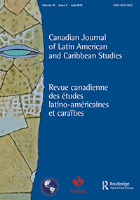
Canadian Journal American and Caribbean Studies
Advancing Scholarly Discourse in American and Caribbean Studies.Welcome to the Canadian Journal of American and Caribbean Studies, a pivotal platform for researchers, professionals, and students interested in the intricate relationships and dynamics of the American and Caribbean regions. Published by Routledge Journals, Taylor & Francis Ltd., this journal presents a rich tapestry of scholarly articles that explore various dimensions of political, geographical, and developmental studies. With a history spanning from 1984 to 2011 and resuming in 2014 through 2024, it continues to contribute to the field's scholarly discourse. The journal currently ranks in the Q4 quartile for Development and Geography, Planning and Development, and Q3 for Political Science and International Relations, underscoring its emerging relevance within these domains. While it is not open access, the journal provides a vital resource for advancing research and fostering academic dialogue among its audience. Explore cutting-edge insights and critical analyses that reflect the evolving landscapes of American and Caribbean studies.
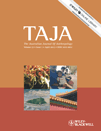
Australian Journal of Anthropology
Advancing the Frontiers of AnthropologyThe Australian Journal of Anthropology, published by Wiley, stands as a pivotal resource in the field of anthropology, reflecting a deep commitment to advancing scholarly discourse since its inception in 1990. With an ISSN of 1035-8811 and E-ISSN 1757-6547, this journal provides a platform for innovative research and critical analysis, contributing to the global anthropology community. Based in the United States, at 111 River St, Hoboken, NJ, it has established itself in the Q3 category of anthropology journals, ranking #162 out of 502 in Scopus, placing it in the 67th percentile among its peers. While it is not currently an open-access publication, the journal remains dedicated to accessibility through institutional subscriptions and provides a wealth of insight into anthropological methods and cultural studies. It seeks to foster interdisciplinary dialogue and promote a comprehensive understanding of social dynamics, making it an essential read for researchers, professionals, and students eager to enrich their knowledge and engage with contemporary anthropological issues.

Worldviews-Global Religions Culture and Ecology
Illuminating the Cultural Narratives of Environmental ResponsibilityWorldviews: Global Religions, Culture and Ecology, published by BRILL in the Netherlands, stands as a vital academic journal that explores the intricate interplay between religion, culture, and ecology. With an ISSN of 1363-5247 and an E-ISSN of 1568-5357, this journal serves as an essential resource for researchers, professionals, and students who seek to understand contemporary global issues through a multidisciplinary lens. The journal has achieved notable rankings in its field, including Q2 in Religious Studies and Q3 in Cultural Studies for 2023, showcasing its relevance and impact. Although not currently open access, its commitment to advancing knowledge and fostering dialogue about the ethical and ecological challenges faced in a rapidly changing world makes it indispensable. By converging insights from various academic disciplines, Worldviews plays a crucial role in enriching the understanding of how cultural and religious narratives shape perceptions of environmental responsibility and sustainability.
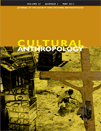
CULTURAL ANTHROPOLOGY
Unveiling the Nuances of Cultural NarrativesCULTURAL ANTHROPOLOGY is a premier journal in the field of anthropology, published by the esteemed SOC CULTURAL ANTHROPOLOGY. With an impressive impact factor and ranking in the Q1 category for both anthropology and arts and humanities, it stands as a leading platform for scholarly discourse and innovative research. Since transitioning to Open Access in 2014, the journal has made substantial contributions to the accessibility of anthropology literature, allowing a broader audience to engage with cutting-edge anthropological insights and findings. The journal's scope encompasses a wide range of cultural studies and anthropological perspectives, catering to a diverse readership that includes researchers, professionals, and students. Published from the Department of Anthropology, Rice University in Houston, Texas, CULTURAL ANTHROPOLOGY continues to shape the conversation in its field, promoting interdisciplinary dialogue and enriching the academic landscape.
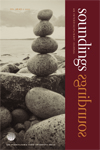
SOUNDINGS
Navigating Complex Societal Dynamics Through ScholarshipSOUNDINGS, published by Penn State University Press, stands as a notable journal within the realms of the arts and humanities, cultural studies, and sociology and political science. With its ISSN 0038-1861 and E-ISSN 2161-6302, this academic periodical has been a platform for critical discourse and innovative research since its inception in the mid-1970s, although it has experienced several convergence periods. Though currently categorized in Q4 within its respective fields, including rankings that reflect its growing influence, SOUNDINGS continues to provide a rigorous space for interdisciplinary dialogue and scholarly reflection. Despite the absence of open access, the journal’s comprehensive articles are vital for researchers, professionals, and students seeking to deepen their understanding of complex cultural and societal dynamics. With its headquarters located at 820 North Univ Drive, U S B 1, Ste C, University Park, PA 16802, SOUNDINGS invites its readership to engage with contemporary issues through a rich lens of academic inquiry.
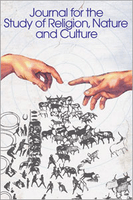
Journal for the Study of Religion Nature and Culture
Fostering Dialogue on the Dynamics of Nature, Culture, and SpiritualityJournal for the Study of Religion Nature and Culture, a prominent academic journal published by EQUINOX PUBLISHING LTD, offers an interdisciplinary platform for scholars exploring the intricate relationships between religion, nature, and culture. With a Q1 ranking in Cultural Studies and Religious Studies, this journal holds a significant position, reflecting its impact and scholarly contributions within its field. The journal’s comprehensive scope encompasses contemporary issues at the intersection of these domains, welcoming innovative research that stimulates dialogue among academics from diverse backgrounds. While it is not currently an Open Access journal, the ISSN: 1749-4907 ensures its availability in libraries and institutions worldwide, fostering knowledge dissemination and engagement. Located in the United Kingdom and pioneering in its field since 2013, Journal for the Study of Religion Nature and Culture invites researchers, professionals, and students to contribute to its mission of advancing understanding of the profound connections shaping our world today.

Settler Colonial Studies
Connecting History, Culture, and Law for a Just TomorrowSettler Colonial Studies, published by Taylor & Francis Australia, stands as a pivotal journal within the interdisciplinary fields of anthropology, cultural studies, history, law, and sociology. With an ISSN of 2201-473X and an E-ISSN of 1838-0743, this journal has established a significant presence since its inception in 2011, continuing to contribute to thought-provoking discussions through 2024 and beyond. As an open-access platform, it provides an invaluable resource for researchers and practitioners in understanding the complexities of settler colonialism and its enduring effects across societies. The journal boasts impressive Scopus rankings—placing in the top quartiles across multiple categories, including Q1 in both Cultural Studies and History—confirming its status in the academic community. By merging rigorous scholarship with critical inquiry, Settler Colonial Studies invites contributions that explore, challenge, and illuminate the intricate realities of colonial histories, shaping valuable dialogues for a diverse readership committed to social justice and historical comprehension.

Australian Humanities Review
Championing Rigorous Inquiry in Literature and HistoryAustralian Humanities Review is a premier journal dedicated to advancing the field of humanities research, published by the Australian National University, School of Humanities. With its ISSN 1835-8063 and E-ISSN 1325-8338, this journal serves as a key platform for scholarly discourse, featuring a variety of articles that explore diverse aspects of the humanities encompassing literature, history, philosophy, and cultural studies. Although it operates on a subscription basis, this journal is known for its rigorous peer-review process, ensuring high-quality contributions that significantly impact the academic community. The Australian Humanities Review aims to foster critical engagement and innovative thinking among researchers, professionals, and students alike, making it an invaluable resource for anyone invested in the evolving landscape of humanities scholarship. Located in Canberra, Australia, the journal reflects not only local scholarship but also global perspectives, enriching the dialogue within the field.

Interventions-International Journal of Postcolonial Studies
Advancing Critical Insights into Postcolonial Dynamics.Interventions - International Journal of Postcolonial Studies, published by Routledge Journals, Taylor & Francis Ltd, stands at the intersection of anthropology and history, providing a crucial platform for scholarly discourse in the field of postcolonial studies. With a commendable impact, as indicated by its Q2 ranking in Anthropology and Q1 ranking in History for 2023, the journal serves a diverse audience of researchers, professionals, and students seeking to engage with critical analyses of colonial legacies and their contemporary implications. Covering an array of topics from 2010 to 2024, Interventions upholds a high academic standard, reflected in its notable rankings on Scopus. Despite not offering an open-access model, the journal remains an essential resource for academics committed to exploring the multifaceted dynamics of postcolonial theory and its applications across various disciplines. By fostering insightful dialogue and innovative research, Interventions contributes significantly to the global understanding of postcolonial issues and the complexities surrounding identity, culture, and power.

Rupkatha Journal on Interdisciplinary Studies in Humanities
Bridging Disciplines for a Holistic UnderstandingRupkatha Journal on Interdisciplinary Studies in Humanities, published by Aesthetics Media Services - AesthetixMS, is a pioneering open-access journal that has been enriching the fields of arts and humanities since its inception in 2009. With an ISSN of 0975-2935, this journal provides a platform for scholarly articles, research, and critical discussions that transcend disciplinary boundaries, fostering a holistic understanding of human culture and creativity. Although it has discontinued its coverage in Scopus, it maintains a commendable rank of #75 out of 163 in the general arts and humanities category, placing it in the 54th percentile—a testament to its contributions to the academic community. Situated in West Bengal, India, Rupkatha is committed to accessibility and the dissemination of knowledge, inviting researchers, professionals, and students alike to engage with its rich content. With its focus on interdisciplinary approaches, the journal plays a vital role in fostering dialogue and innovation within the humanities, making it an essential resource for anyone interested in exploring the complexities of human expression.